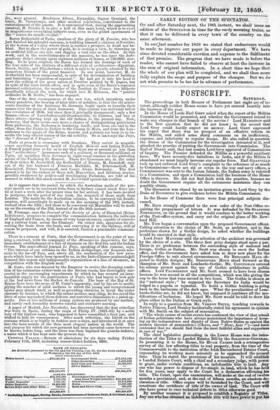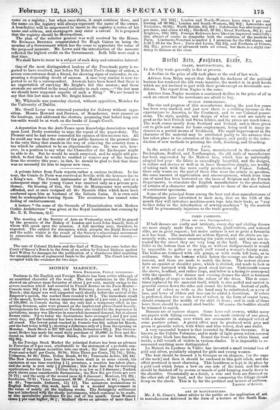POSTSCRIPT.
SATURDAY.
The proceedings in both Houses of Parliament last night are of in- terest, although neither House seems to have yet entered heartily into the business of the year.
In the House of Lords Earl GREY asked when the report of the Militia Commission would be presented, and whether the Government intend to make any changes in that branch of the service ? Lord HARDINGE said to the first question that he did not know ; to the second that Lord Grey could hardly expect an answer. Lord GREY expressed his regret that there was no prospect of an effective reform in the Militia, and added some sharp comments on its inefficiency, expense, and inferiority to regular troops. He also called in question the fitness of the Commission for the investigation intrusted to it, and attacked the practice of putting the Government into Commission. The Earl of DERBY said, that last session Lord Grey approved of Commissions of Inquiry. The Premier defended the Militia as a powerful auxiliary force. We have seventy-five battalions in India, and if the Militia is abandoned we must largely increase our regular force. Earl Gas-NI-Him took up and enforced Lord Grey's complaint to the reference of so much to Commissions—there are six or seven in the war and navy offices, a Commissioner was sent to the Ionian Islands, the Indian army is referred to a Commission, and upon a Commission half the business of the Home Office is thrown. He did not find fault with the practice, because no doubt the Government require all the extraneous assistance they can possibly obtain.
The discussion was closed by an invitation given to Lord Grey by the Duke of RICHMOND to give evidence before the Militia Commission.
In the House of Commons there were four principal subjects dis- cussed.
Mr. Riot strongly objected to the new order of the Post Office re- quiring the prepayment of letters. It was defended by Sir STAFFORD NORTHCOTE, on the ground that it would conduce to the better working of the Post-office system, and carry out the original plans of Mr. Row- land Hill.
Mr. Trre began a conversation upon the proposed Government offices. Calling attention to the choice of Mr. Scott, as architect, and to the preference shown for a Gothic design, he asked whether the buildings would be executed in that style.
Lord Joint MANNERS said the selection of the architect was governed by the choice of a site. The three first prize designs stood upon a par. There is no preference between the contending style of national and foreign, Gothic or Italian. Mr. Scott was chosen to erect the Indian office, and the Government have asked him to draw new plans for the Foreign Office to suit altered circumstances. Sir BMSJAMIN HALL ob- jected to Gothic designs; Mr. BERESFORD HOPE stood forward as the champion of Mr. Scott and Lombardo-Gothic. Mr. Coimeemkat entered his solemn protest against the use of Gothic architecture in public offices. Lord PALMERSTON said Mr. Scott seemed to have been chosen because he was second in all the competitions, which was like giving the cup to the horse that runs second in two heats. The Gothic is chosen as the "national style ; " he supposed the Secretary for India would be lodged in a pagoda or tajmahal. To build a Gothic building is going back to the barbarism of the dark ages. What the peculiarities of Loin- bardo-Gothic are, he did not know, but supposed it combines all the mo- difications of barbarism. He hoped Mr. Scott would be told to draw his plans either in the Italian or Greek style. In reply to a question from Mr. VERNON SMITH, touching rewards to Native Princes, Lord Stanley incidentally stated his agreement in opinion with Mr. Smith on the subject of annexation. "The whole course of recent events has confirmed the view of that school of Indian politicians who have always maintained the importance of keep- ing up the independence and dignity of these Native States as against the modern theories of annexation—(C/seers, and "Hear, hear !")—and have contended that we should find them the most faithful allies and supporters in case of war."
The chief legislative proceeding in the Lower House was the intro- duction of the Titles to Landed Estates Bill by the Somerrou-GeNenaL. In presenting it to the House, Sir Flees Cenies took a retrospective survey of the law affecting titles to real property, from the time of the Commonwealth to the institution of the Irish Encumbered Estates Court, expounding its working more minutely as he approached the present time. Then he stated the provisions of his measure. It will establish a Landed Estates Court, with a chief and a secondary judge, with power to grant, under certain conditions, an indefeasible title to land. Any one who has power to dispose of fee-simple in land, which he has held for five years, may apply to the Court for a declaration affirming his title. The Court, upon due examination, will make at the end of twelve months a provisional, and, at the end of fifteen months, an absolute de- claration of title. Office copies will be furnished by the Court, and will constitute the certificate of title of the owner of land. The Court will also have power to cure technical defects in titles otherwise geed. By another measure it is proposed to establish a Registry of Title!. Any one who has obtained an indefeasible title will have power to put his
name on a registry ; but when once there, it must continue there, and the name on the registry will always represent the name of the owner. A leaseholder will be empowered to inert in the registry a notice of his name and address, and mortgagors may enter a caveat. It is proposed that the registry should be Metropolitan.
The plan of the solicitor general was well received by the House. Sir RTCLIARD BETHELL congratulated Sir Hugh Cairns on being the member of a Government which has the sense to appreciate the value of the proposed measure. Mr. LOWE said the introduction of the measure reflected the highest credit on the Government. Both bills were read a first time.
We shall have to recur to a subject of such deep and extensive interest.



































 Previous page
Previous page